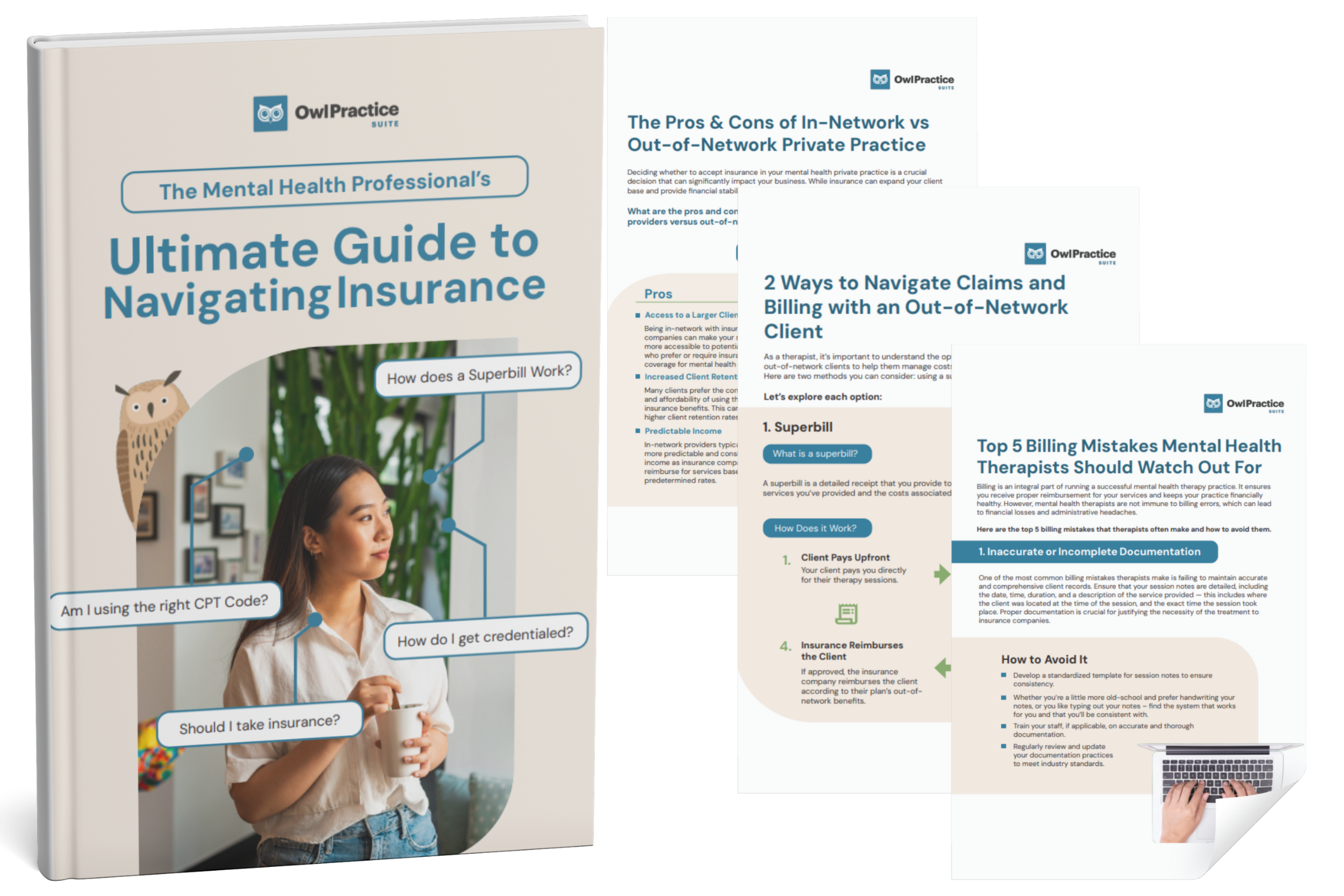Billing is an integral part of running a successful mental health therapy practice. It ensures you receive proper reimbursement for your services and keeps your practice financially healthy. However, mental health therapists are not immune to billing errors, which can lead to financial losses and administrative headaches.
Here are the top 5 billing mistakes that therapists often make and how to avoid them.

Inaccurate or Incomplete Documentation
One of the most common billing mistakes therapists make is failing to maintain accurate and comprehensive client records. Ensure that your session notes are detailed, including the date, time, duration, and a description of the service provided — this includes where the client was located at the time of the session, and the exact time the session took place. Proper documentation is crucial for justifying the necessity of the treatment to insurance companies.
How to Avoid It
- Develop a standardized template for session notes to ensure consistency.
- Whether you’re a little more old-school and prefer handwriting your notes, or you like typing out your notes – find the system that works for you and that you’ll be consistent with.
- Train your staff, if applicable, on accurate and thorough documentation.
- Regularly review and update your documentation practices to meet industry standards.
Incorrect CPT Codes
Using incorrect Current Procedural Terminology (CPT) codes is a common billing error. Choosing the wrong code or typing in the wrong code for a specific service can result in denied claims and lost revenue. It’s crucial to use the appropriate CPT code that accurately represents the service provided.
How to Avoid It
- Stay updated on the latest CPT codes and revisions.
- Double-check codes for accuracy before submitting claims.
- Regularly review the CPT code book or online resources for guidance.
Failing to Verify Insurance Coverage
Not verifying a client’s insurance coverage or failing to update it regularly is a significant mistake. Insurance plans can change, and clients may switch providers or experience changes in their coverage. Relying on outdated information can lead to denied claims and complications.
How to Avoid It
- Always verify a client’s insurance cover- Regularly update insurance information
- Train your front-office staff to con- firm coverage details with clients.
- Communicate to your clients that they should update their insurance information with you as soon as it changes.
Neglecting Timely Filing Deadlines
Insurance companies often have strict deadlines for filing claims. Missing these deadlines can result in denied claims, leaving you without payment for your services. Some insurance providers may not allow claims to be filed after a specific time frame, which means the therapist bears the cost.
How to Avoid It
- Implement a systematic process for tracking and filing claims promptly.
- Set reminders and establish a regular filing routine to prevent missed deadlines.
- Keep all necessary documentation and paperwork organized for quick access.
Misinterpreting Insurance Policies
Another common billing mistake is misinterpreting insurance policies. Each insurance company has its own unique rules and guidelines, which can be complex. Misunderstanding or misinterpreting these policies can lead to improper billing practices and denied claims.
How to Avoid It
- Read and understand the insurance provider’s policies and guidelines.
- Attend training or workshops on billing and coding practices.
- Seek guidance or clarification from the insurance provider when in doubt.
- Identify who your provider representative is and contact them if you have any questions about your contract or the claims process.
Summary
Avoiding these top billing mistakes can help you maintain a financially healthy practice and ensure that clients receive the quality care they deserve. Regular training, documentation reviews, and staying informed about the latest changes in billing practices and insurance policies can help therapists minimize these common pitfalls and focus on their primary goal: Providing effective mental health therapy services.

Get the “Ultimate Guide to Navigating Insurance” eBook Below!
Reduce clinical administrative tasks and transform more lives with Owl Practice. Owl Practice provides all the tools you need to make your practice successful. Join the thousands of care professionals using Owl to run their practice every day.



